Career interview: Defence analyst
Helen graduated in 2002 from the University of Bath with a Joint Honours degree in Mathematics and Statistics. She is now a defence analyst working for Dstl - the Defence Science and Technology Laboratory - which is part of the Ministry of Defence. She tells Plus about her exciting career as a civil servant!
Maths can open many doors
Right from when she did her GCSE's, Helen knew she would study further in maths - she says simply "I just found I could do it and you always enjoy things you can do". At least part of the credit she attributes to some very good maths teaching at her school, Hagley Park Sports College in Staffordshire. Already hooked on maths by GCSE's, for A-levels she chose to study Maths, French and General Studies, and also took an AS-level in Further Maths.
The choice of a mathematical degree subject then seemed natural. Having decided to specialise in maths at A-level simply because she liked it - "I didn't really have a career in mind" - Helen says she then thought "if I do a maths degree, it'll open many doors".

Pulteney Bridge, Bath.
Image courtesy of the University of Bath
Helen decided to study at the University of Bath, despite its distance from her home in the North of England. Having visited Bath when she was a child, she had fallen in love with the place, and she wanted to go some distance from home and spread her wings. "I wanted to go to Bath. Firstly it's a really good maths department and secondly it's a lovely place to live. I went to the Open Day. It's a very friendly Department and that really came across."
At first, Helen started off doing a degree in statistics, but she actually graduated with Joint Honours in Mathematics and Statistics. "I didn't have to repeat a year or anything in order to change course. In my first and second year I had to do so much core pure maths that I thought I might as well have a degree with 'maths' in its title as well as 'statistics'!"
So why statistics, rather than maths? "It just seemed more applicable. I did A-level Pure Maths and Stats and I could see how the stats could be used in the real world. It just seemed more useful. I can see the importance of pure maths now, but for me it's more like a tool, for things like statistics and mechanics."
Public understanding of mathematics
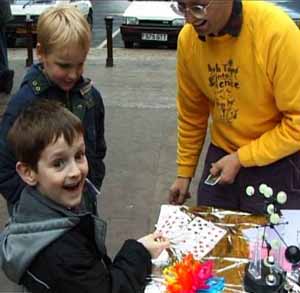
Pick a card, any card!
Image courtesy of the University of Bath
One of the most enjoyable options during Helen's degree course was a module entitled Public Understanding of Mathematics. "All my other modules were hardcore maths so I really enjoyed the chance to do something like the Public Understanding module. I got to help out at 'Bath Taps into Science' and also the Swindon Children's Maths Masterclasses." (Bath taps into science is an annual Science Fair, and the staff of the Maths Department at the University of Bath are very active in promoting mathematical ideas to children and members of the general public.)
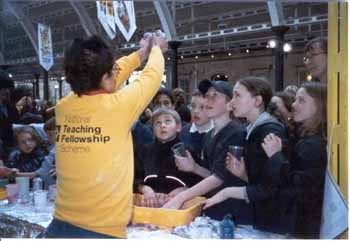
Just look at those faces...
Image courtesy of the University of Bath
As well as the Public Understanding module, Helen enjoyed the more applied courses - what really interests her about maths is its applicability. "I liked Applied Statistics - I particularly enjoyed Stochastic Processes and Management Statistics." Some of the pure mathematics was a grind though. "In first and second year, some of the pure maths which you have to do - and I appreciate that you have to do it - was quite dry. Third year was the best because I could specialise much more and do more applied." Helen also took a module in Operational Research, which has since come in handy in her role as an analyst.
Maths for thrills
Helen started to think about careers at the beginning of her final year. She had strong feelings about the sort of job that attracted her. "I think a lot of people who do a maths degree go on to do accountancy or maths teaching and I really didn't want that. I wanted to do something exciting. "
Of course, any maths teachers or accountants reading this are no doubt saying "what is she talking about? My career is exciting!" But Helen has an unusual take on what is exciting... "I had always thought about the Civil Service. It appealed to me for some reason." This seems a little odd until you realise that for Helen, "Civil Service" meant "Ministry of Defence"!
Characteristically, Helen was methodical about getting the information she needed. (When I arrived to interview her, Helen presented me with printouts of pages from Dstl's website, with important points neatly highlighted, and during the interview, she whipped out a sheet she had written out with all the salient stages of her career written out in order!) "I found out about Dstl through a Careers Fair at University, and I spoke to a representative who told me 'you get to use your degree and make a real impact, carrying out work of national significance'." Dstl carries out research and analysis for the UK defence system. There are around 3,000 staff at Dstl - which is part of what used to be DERA (the Defence Evaluation and Research Agency) - and it employs the largest number of scientists and engineers now in public service.
My lips are sealed
As a defence analyst, Helen's work is classified, and in fact interviewing her was quite a production. Before being allowed to speak to Plus, she had to get security clearance, at which she was briefed about what she was and wasn't allowed to say. "I work on two projects at the moment. I can tell you what they are but not really what I do."
On the day of the interview, when I arrived at the site in Farnborough, I was photographed at reception and given an ID badge with my picture on it. I was then personally escorted to Helen's desk. I asked Helen if she found this level of security intimidating. "It was really intimidating at first, particularly when I came here for my interview - but you quickly get used to it. Now I swan around quite happily. All the security procedures that you have to go through...it was weird, it really was! But it just seems normal now. If I get another job, I'm going to be locking my computer away, I've got so used to it!"
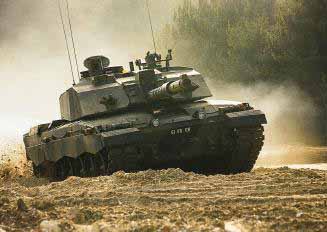
Maintaining military capability
Crown Copyright/MOD; reproduced by permission
Helen has now been at Dstl for seven months. "I work in the PCS department - Policy and Capability Studies." This department specialises in operational analysis, which is used to support decision-making by the MOD and the UK Government. As well as its role in policy-making, the department looks at such issues as the peacetime management of the MOD, and decisions regarding military capability. She is working on two projects at the moment. "One is Ground-Based Air Defence (GBAD), and the other is Theatre Ballistic Missile Defence (TBMD). Due to the current situation in Iraq, TBMD is a really exciting study to be on at present. Lots of the time, what we're doing is with regard to hypothetical situations, so being on the TBMD team is real cutting edge stuff."
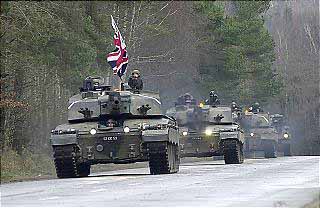
Getting out in the field
Crown Copyright/MOD; reproduced by permission
One of the best things about Helen's job is the commitment Dstl has to her professional development. "I get to go on a lot of courses and conferences. I've been on a TEWT - a Training Exercise Without Troops. It's quite weird, the whole working environment here, because it's civilian, but then it's the military as well. It was quite odd to start off with, seeing people in uniform walking past my desk, but now I'm used to it. For the TEWT, the army officers took us out into the Hampshire countryside and we played out war scenarios, focusing on the best places to deploy troops and equipment. That was good to actually get out in the field. It raises your military awareness." As well as this more specific sort of training, Helen has been on more generic courses, such as one on Excel, and she also gets to travel to all the different Dstl sites and will soon be going on conference at MOD headquarters in Whitehall. "I also have the opportunity to join Front Line as an Augmentee. Some of the current members of Front Line are soon to be deployed in Kuwait, to carry out operational analysis there.
"On a normal day, I'm at my computer. I do research work, report writing, admin and some computer programming. I did as little programming as possible at University, it wasn't my favourite thing, but it's okay here."
There are strong links between the MOD and their equivalents in the US and Europe, particularly the US - research agreements with the US account for about half of Dstl's collaborative research and development work.
Defending the peace
I asked Helen if she ever found it uncomfortable, or strange, working for military purposes. "I can see what you're saying but it's more complex - we're 'defending the peace', maintaining national security. For example, we advise the Government and the MoD on what equipment to use, and how much of it."

Testing equipment
Crown Copyright/MOD; reproduced by permission
Dstl are also very involved in Operational Research in other fields - at the height of the foot and mouth epidemic, they were called on, at very short notice, to advise on disposal options for infected carcasses. And some of the advances made originally for military reasons are now used in Civvie Street - such as diagnostic facilities, developed for urgent military treatment, and now used in the diagnosis of meningitis and the treatment of cancer.
Although Helen also looked into working at Government Communication HeadQuarters (GCHQ), in fact she never ended up applying, because she was offered a job by Dstl first and decided to take it. "I would have pursued the GCHQ application. I actually looked at going into a maths role with them, but I also considered a management trainee scheme. That's a thought for the future. I think once you're in the Civil Service it's quite easy to move around." The other place Helen considered working was Mars, but in the end she didn't apply. The Dstl job was the only one that got that far. The applications procedure wasn't too onerous - there was just one interview - but then security clearance then took about five months. Fortunately, Helen applied in February, so she was able to start work pretty much as soon as she graduated.
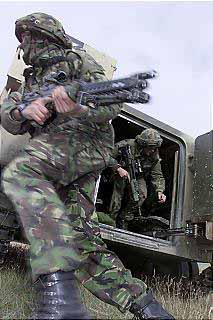
Never a dull moment
Crown Copyright/MOD; reproduced by permission
And where does she see things going for her in the future? "I think that within a couple of years [in Dstl] you can get to project manager status. The only thing is that we're moving to Portsmouth in 2005 which is something I'm going to have to think about... But anyway, nowadays people don't just have the one career. I'd actually quite like to go into journalism, that's something that's always really interested me, although I know it's hard to get into.
"During one of my summers at Uni, I did work experience for the BBC, in the Wildlife Department - I thoroughly enjoyed that. Every morning I got to write an article for BBC Online, about a contemporary wildlife story. They gave me some responsibility, which I appreciated."
Any downsides to Helen's working life? "It's so expensive here in Farnborough, on the London commuter belt! I actually applied to the Dstl site in Malvern in Worcestershire - it wasn't quite so far away from home and I knew it would be a lot cheaper to live there, but I got an interview here and I felt I had to take it."
And does she still think that the Civil Service is exciting? "Yes! Especially in the current climate. I can't think of a more exciting field to be in than defence at present. It's nice to feel in the loop."
About this article
Helen Joyce is editor of Plus. For this article, she interviewed Helen [for security reasons, the surname is omitted] at Dstl in Farnborough.